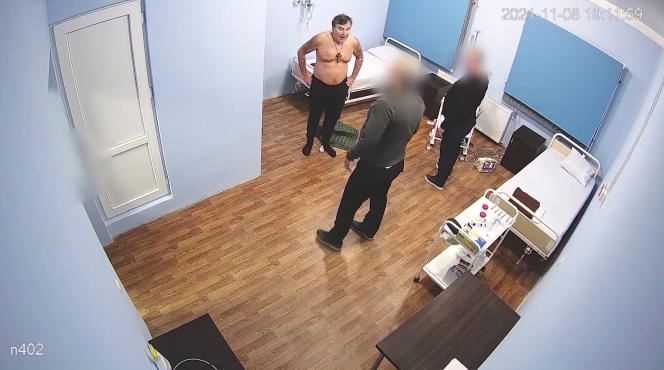The images, from the surveillance cameras of the prison services, loop on social networks in Georgia. A video released Thursday, November 11 shows the forcible transfer of former President Mikheil Saakashvili from his Rustavi prison, where he had been imprisoned since 1er October on his return from exile, to a prison hospital in Tbilisi, the capital. We see the leader of the opposition, on a hunger strike for 43 days, dragged unceremoniously by several men inside the building and then deposited in his cell, his upper body bare. “Bring me back in prison in Rustavi! I refuse medical procedures. You are Putin’s slaves, throws the former ruler at the guardians. I don’t want to calm down, how do you want me to calm down? “
Mikheil #Saakashvili was taken to #Gldani Prison Hospital by force, Footage released by the Penitentiary Service sh… https://t.co/JfHM0WZ09k
The treatment of the pro-Western leader of the “Rose Revolution,” a peaceful movement that ousted post-Soviet elites from power in 2003, has shocked beyond his circle of followers – estimated at 20% of the population. EU Ambassador to Georgia Carl Hartzell on Friday called the Special Prison Service’s release of the video “Very questionable and regrettable” and called to “To uphold fundamental rights, in particular those of privacy and dignity”.
For its part, the United States has urged the authorities to “Take immediate action to ensure that Mr. Saakashvili’s mental health and medical needs are met” and urged the Georgian government to “Treat properly and with dignity, in accordance with international standards and Georgian law”. In Ukraine, where Mr Saakashvili lived in exile, President Volodymyr Zelensky denounced “Disproportionate coercive measures” against a Ukrainian citizen – the former Georgian president has had Ukrainian nationality since 2019.
Amnesty International is also alarmed, denouncing a “Violent transfer” and “Supposed threats” on the former president, “Deprived of dignity, privacy and adequate health care”. “It looks like a political revenge”, added the human rights NGO.
Attacks on democracy
This episode casts a new shadow on Georgia, which has long been an example of democratic transition in the post-Soviet space. The European Union and the United States have spent billions of dollars for more than twenty-five years to support this effort and to help it out of the fold of Russia. But, for a year and the contested elections of October 2020 – narrowly won by the ruling Georgian Dream party – Georgia has gone from crisis to crisis, while attacks on democracy have multiplied. As such, the treatment of the former president is closely monitored by Brussels and Washington.
You have 53.57% of this article to read. The rest is for subscribers only.
